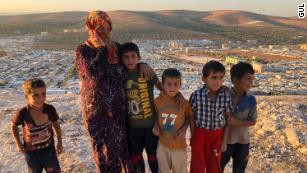US ends funding for stabilizing Syria, stresses commitment to defeating ISIS
The US will end funding for stabilization efforts in Syria in another sign of President Donald Trump's intent to pull out of the long-running conflict.
The State Department said Friday that it would redirect $230 million that had been intended to help rebuild Syria to other foreign priorities it declined to describe. Officials said the shortfall would be more than made up by allies' contributions of $300 million for stabilization projects in Syria, including demining and irrigation.
The officials said the decision reflects the success of Trump's direction that US allies contribute more to Syria stabilization efforts. They said the new funding would go toward priorities the US had identified, and they pushed back against suggestions that the US decision represents a retreat from leadership or a decline in Washington's commitment to the conflict.
"We remain committed to our efforts in Syria," State Department spokeswoman Heather Nauert said in a call with reporters to announce the policy.
Shlomo Bolts, the policy and advocacy officer for the Syrian American Council, a grassroots group that works with Syrian opposition to President Bashar al-Assad, said the announcement was a disappointment.
"It's pretty distressing, frankly," Bolt said.
He said the argument that the funding would be made up elsewhere missed a crucial point.
"The main value of the US is not just dollars and cents," Bolt said. "It's leadership in setting up a real system of governance and sending a signal to partners and the rest of the world."
'The mission is ongoing'
The conflict in Syria erupted in 2011, when Assad brutally suppressed pro-democracy protests. It spread rapidly, evolving into a hydra-headed civil war that has fed the growth of ISIS and drawn in regional and global powers, including Saudi Arabia, Russia, Turkey, Iran and the United States, each with its own agenda
Asked about perceptions that the pullback in US funding for Syria's stabilization is a retreat from US commitment, Brett McGurk, the special envoy to the global coalition that's battling ISIS, said that "we're remaining in Syria" with a focus on defeating the terrorist group. He said a "final phase" of military operations against ISIS is being prepared now.
It will be "a very significant military operation because we have a very significant number of ISIS forces holed up" in their remaining redoubts, he said. "This mission is ongoing. It's not over."
Trump said in March that the US would "be coming out of Syria like very soon" and trumpeted his administration's success in ejecting ISIS from most of Syria and Iraq. "We're knocking the hell out of ISIS," Trump told an Ohio audience. "We'll be coming out of Syria like very soon. Let the other people take care of it now."
Bolt said the decision to reduce funding for Syria's stabilization could directly affect the fight against ISIS.
"Remember that stabilization funding is part of a wider program to defeat ISIS," Bolt said. He noted that the terror group has already shown a facility for surviving military defeat by hiding within communities. "This funding is how we inoculate local populations and partners from a resurgence of ISIS later on," he said.
The Pentagon said Wednesday that ISIS very much remains a threat and is "well positioned" to rebuild despite being driven to only a few small towns on the banks of the Euphrates River in Syria. A report by the Defense Department's inspector general said the US military estimates that ISIS still commands up to 30,000 fighters in Syria and Iraq and remains a global threat.

Vaciha Turki Al Omar, 30, has been in Idlib for seven months. She on the hill overlooking the sprawling refugee camp with her kids. "We can try to fight, but the kids are our weakness so we must run away," she says.
McGurk said Friday that a slew of other countries had contributed to the $300 million for Syria's stabilization, including Denmark, Australia, Kuwait and Italy. Saudi Arabia contributed $100 million, while the United Arab Emirates contributed $50 million, according to the State Department.
"These contributions will allow us to continue at pace ... and continue for the foreseeable future," McGurk said. "We're confident this is just the start. We have a very committed coalition."
David Satterfield, the acting assistant secretary of state for Near East affairs, said tensions between the US and Turkey, another major player in Syria, have not affected military cooperation there. Trump and Turkish President Recep Tayyip Erdogan have been locked in an escalating cycle of tariffs and heated rhetoric over Ankara's imprisonment of a US pastor.
"There has been no consequence or impact that we can discern on the other bilateral issues in play here," Satterfield said. "There has been no impact" on cooperation.
He said efforts to resolve a dispute with Turkey over Kurdish fighters at the northern Syrian town of Manbij have been going well. Work "upon the Manbij road map by all parties involved has been smooth and extremely encouraging," he said.
The political process
Satterfield and McGurk said the US and its coalition partners have made clear that stabilization funding is tied to efforts to establish a political solution to the conflict.
Satterfield said the US government has told Russia, which has lent the Syrian regime crucial support, "that there will be no international reconstruction assistance for Syria without the irreversible political process validated by the" United Nations.
Satterfield and McGurk said that should provide an incentive for Syria and Russia to cooperate with efforts to establish a political agreement ending the conflict.
"That's the door to what we believe the regime, the Russians want: international money flowing into the wreckage that is Syria," Satterfield said.
Nauert also announced on Friday the appointment of veteran diplomat James Jeffrey, a former ambassador to Iraq and Turkey, to be a special adviser on Syria to Secretary of State Mike Pompeo. She said former National Security Council official Joel Rayburn will become the deputy assistant secretary for the Levant -- a term for the section of the Middle East that includes Syria.
News Courtesy: www.cnn.com











